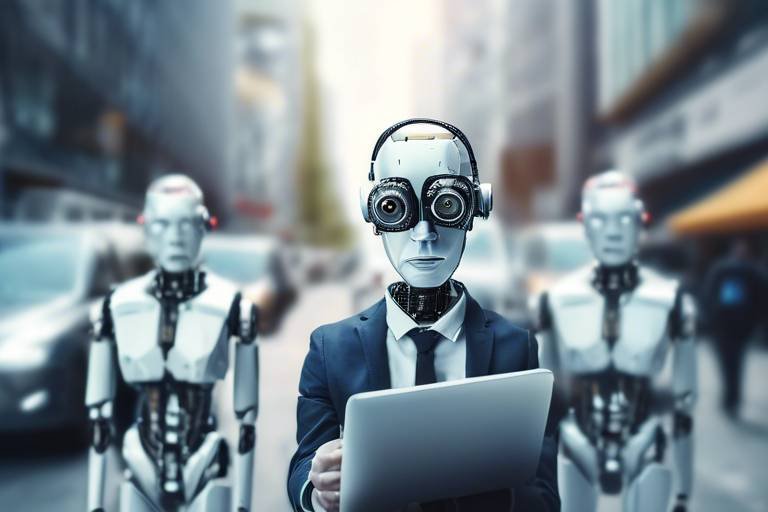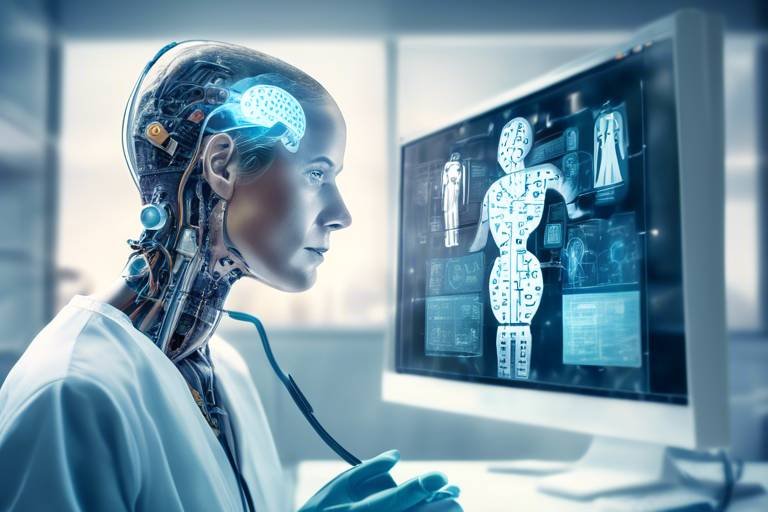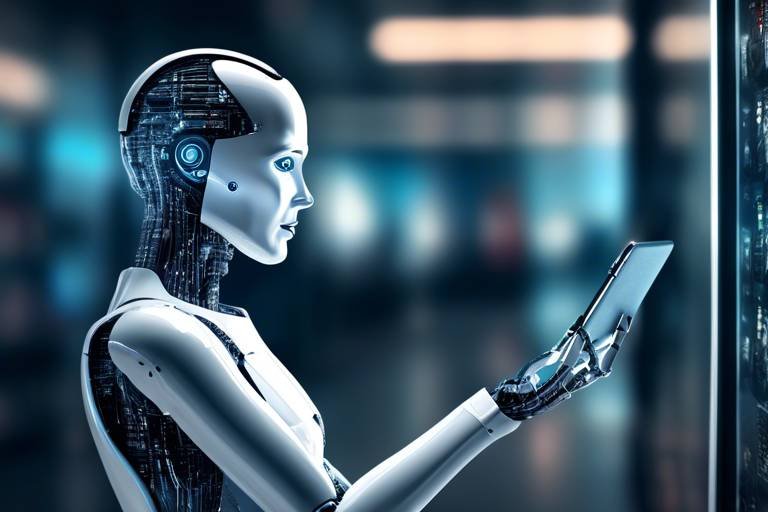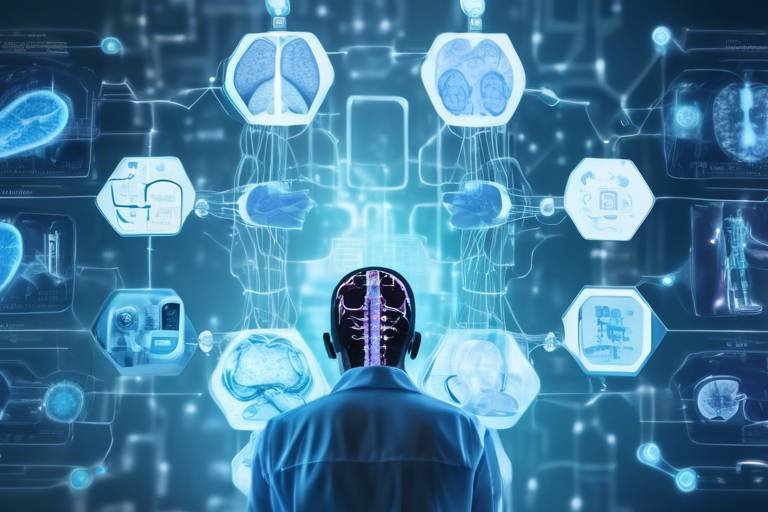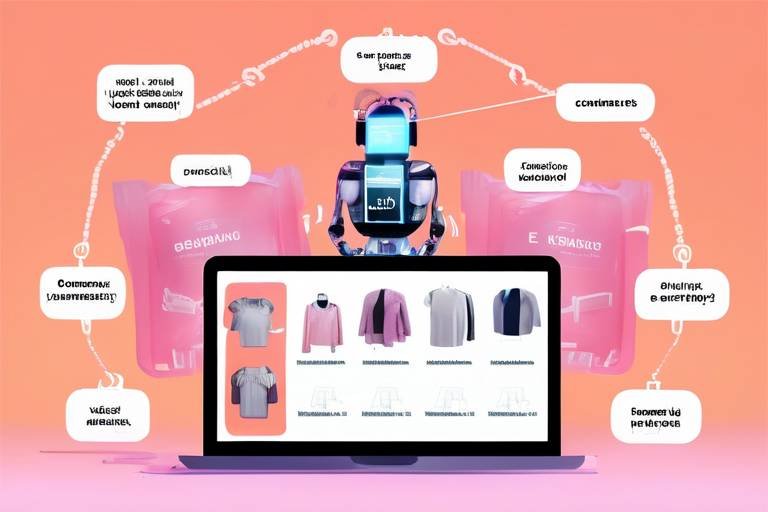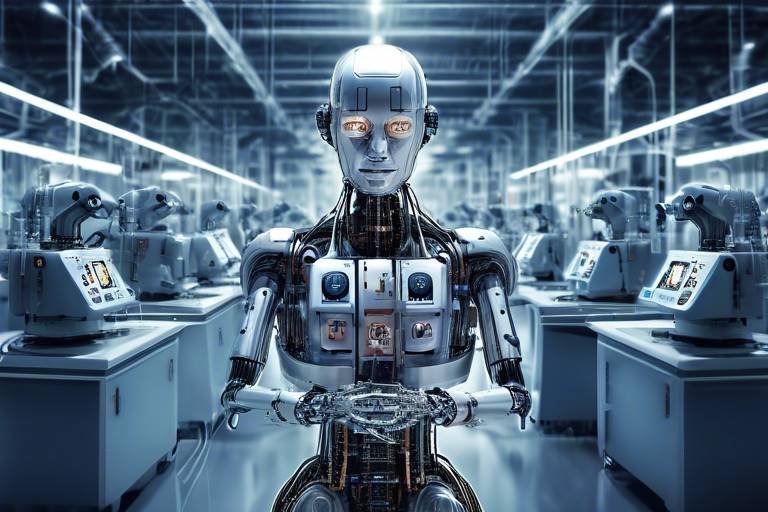AI’s Role in Changing the Job Market
The advent of artificial intelligence (AI) is nothing short of a revolution, and it's reshaping the job market in ways we could only dream of a few decades ago. Imagine walking into a workplace where machines handle the mundane tasks, leaving humans to focus on creativity and innovation. Sounds futuristic, right? Well, that future is now! AI is not just a buzzword; it’s a game-changer that’s influencing every industry, from healthcare to finance, and even education. This transformation is creating a new landscape of employment opportunities, altering skill requirements, and redefining what it means to work in the modern world.
As AI continues to evolve, it’s essential to understand its profound impact on employment dynamics. Gone are the days when a college degree guaranteed a stable job for life. Today, adaptability and continuous learning are the names of the game. With AI taking over repetitive tasks, the demand for skilled workers is shifting dramatically. Companies are no longer just looking for individuals who can perform tasks; they want problem solvers, innovators, and critical thinkers. This shift not only affects job availability but also the types of skills that are in demand. So, how do we prepare for this brave new world of work?
One of the most significant changes AI brings is the rise of automation. By automating routine tasks, businesses can streamline operations and reduce costs. But what does this mean for the workforce? While some jobs may vanish, new ones are emerging, often in areas we haven’t even considered yet. For instance, roles in AI ethics, data analysis, and machine learning are becoming increasingly crucial. This duality of job creation and elimination paints a complex picture of the future job market.
Moreover, the integration of AI is not limited to technical fields. Industries like customer service, marketing, and even creative sectors are witnessing a transformation. Imagine chatbots handling customer inquiries or AI tools assisting in content creation. The potential is limitless! However, this also means that workers must be prepared to embrace change and develop new competencies to stay relevant.
In summary, AI is not just changing the job market; it’s redefining it. The key takeaway is that while AI may eliminate some jobs, it also creates new opportunities that require a different skill set. Embracing this change with an open mind and a willingness to learn will be vital for anyone looking to thrive in the future workforce. So, are you ready to adapt and seize the opportunities that AI presents?
- How is AI affecting job availability? AI is automating many routine tasks, which can lead to job displacement in some sectors, but it also creates new roles that require different skills.
- What skills are most in demand due to AI? Technical skills such as programming, data analysis, and data literacy are increasingly sought after, along with soft skills like communication and emotional intelligence.
- Will AI completely take over jobs? While AI will automate certain tasks, it is unlikely to completely replace jobs. Instead, it will change the nature of work and the skills required.
- How can workers prepare for an AI-driven job market? Workers can prepare by embracing lifelong learning, developing technical skills, and enhancing their adaptability to new technologies.

The Rise of Automation
Automation is not just a buzzword; it’s a **revolution** that’s reshaping the very fabric of our industries. Imagine walking into a factory where robots are diligently assembling products while humans oversee the operations from a distance. This scenario is becoming increasingly common, as automation streamlines processes and enhances efficiency. But what does this mean for the workforce? The implications are profound and multifaceted.
On one hand, automation reduces the need for manual labor, which can lead to a **significant reduction** in job availability in certain sectors. For instance, in manufacturing, machines can perform tasks faster and more accurately than human workers, leading companies to opt for robotic solutions over hiring additional staff. This shift raises a crucial question: What happens to those who find themselves replaced by machines? The anxiety surrounding job displacement is palpable, as many workers fear they may become obsolete in an increasingly automated world.
However, it’s not all doom and gloom. While automation may eliminate some jobs, it’s also creating new opportunities. The demand for skilled workers who can manage, maintain, and program these automated systems is on the rise. In fact, a report from the World Economic Forum suggests that by 2025, automation could create **85 million new jobs** globally. This duality of job loss and job creation highlights the need for a workforce that is adaptable and ready to embrace change.
To navigate this shifting landscape, businesses and employees alike must understand the dynamics of automation. Here are some key implications:
- Increased Efficiency: Automation can lead to faster production times and lower operational costs.
- Job Transformation: Many roles will evolve rather than disappear, requiring workers to adapt to new technologies.
- Focus on Higher-Level Tasks: With machines handling routine tasks, employees can concentrate on strategic and creative aspects of their jobs.
As we delve deeper into the automation phenomenon, it’s essential to acknowledge that the **transition** may not be smooth for everyone. Workers in industries heavily reliant on manual labor may face challenges in re-skilling or up-skilling. This is where government and corporate responsibility comes into play. Initiatives aimed at providing training and support for displaced workers are crucial in ensuring a smooth transition into the new job market. The question remains: Are we prepared to meet the challenges posed by automation, or will we let fear dictate our future?

Shifting Skill Requirements
The advent of artificial intelligence (AI) is like a double-edged sword, cutting through traditional job roles while simultaneously carving out new paths for employment. As AI technology continues to evolve at a breathtaking pace, the skills required in the job market are also undergoing a significant transformation. Workers who once relied on routine tasks and manual skills are now finding themselves at a crossroads, where the ability to adapt and learn new competencies is paramount. In this rapidly changing landscape, it's essential to recognize the skills that are becoming vital for employment and how individuals can position themselves for success.
One of the most noticeable shifts is the increasing demand for technical skills. As companies integrate AI into their operations, they are on the lookout for individuals who can navigate this new terrain. Skills like programming, data analysis, and machine learning are now more than just buzzwords; they are becoming essential competencies for job seekers. For instance, knowing how to write code or analyze data sets can significantly enhance a candidate's appeal in the job market. In fact, a recent survey showed that nearly 70% of employers are prioritizing candidates with technical skills in their hiring processes.
| Technical Skills in Demand | Importance |
|---|---|
| Programming | Essential for developing AI applications and automating processes. |
| Data Analysis | Critical for making informed business decisions based on analytics. |
| Machine Learning | Key for creating algorithms that improve over time. |
However, it's not just about technical prowess. The importance of data literacy cannot be overstated. In a world where decisions are increasingly data-driven, understanding how to interpret data is vital across all sectors. Whether you’re in marketing, finance, or healthcare, being able to read and analyze data can set you apart from the competition. It’s akin to having a map in a foreign land; without it, you might find yourself lost and disoriented.
Moreover, the job market is also emphasizing the need for adaptability and a commitment to lifelong learning. In an environment where change is the only constant, the ability to pivot and acquire new skills quickly is invaluable. Workers who embrace a mindset of continuous improvement and learning will not only survive but thrive in this dynamic landscape. This means actively seeking out opportunities for professional development, whether through formal education, online courses, or self-directed learning. Just like a chameleon adapts to its surroundings, so too must today’s workers adapt to the ever-evolving demands of their industries.
Finally, while technical skills are crucial, let’s not forget the significance of soft skills and emotional intelligence. In an increasingly automated world, the human touch remains irreplaceable. Skills like communication, collaboration, and problem-solving are becoming more important than ever. Employers are looking for individuals who can work well in teams, navigate complex interpersonal dynamics, and lead with empathy. After all, even the most advanced AI can’t replicate the nuances of human interaction.
In summary, the shifting skill requirements in the job market demand a holistic approach to professional development. Balancing technical skills with data literacy, adaptability, and soft skills will equip workers to navigate the complexities of an AI-driven future. It's a thrilling yet daunting journey, but those who are willing to learn and grow will find themselves well-prepared for whatever lies ahead.
- What are the most important technical skills to have in the AI job market?
Skills such as programming, data analysis, and machine learning are in high demand.
- How can I improve my data literacy?
Consider taking online courses, attending workshops, or utilizing educational resources to enhance your understanding of data.
- Why are soft skills important in an AI-driven workplace?
Soft skills like communication and emotional intelligence are essential for effective collaboration and leadership, which AI cannot replicate.
- How can I stay adaptable in a changing job market?
Commit to lifelong learning, seek new experiences, and be open to change to enhance your adaptability.

Technical Skills in Demand
As we navigate through the ever-evolving landscape of the job market, one thing is crystal clear: technical skills are becoming more crucial than ever. With the rise of artificial intelligence (AI) and automation, employers are on the lookout for individuals who not only understand the technology but can also leverage it to drive business success. So, what exactly are these in-demand technical skills? Let's dive in!
First off, programming skills are at the forefront. Whether it’s Python, Java, or R, being able to write code allows professionals to create algorithms that can analyze data, automate tasks, and even develop AI applications. The beauty of programming is that it opens doors to various fields, from software development to data science, making it a versatile skill.
Another skill that's gaining traction is data analysis. In a world where data is often referred to as the new oil, the ability to interpret and analyze data sets is invaluable. Companies are increasingly relying on data-driven decision-making, and those who can extract insights from data will find themselves in high demand. This includes familiarity with tools like SQL, Excel, and data visualization software like Tableau or Power BI.
Moreover, understanding machine learning concepts is becoming essential. As AI technologies advance, having a grasp of how machines learn from data can set candidates apart. This doesn’t mean you need to become a data scientist overnight, but grasping the basics of machine learning algorithms and their applications can significantly enhance your employability.
In addition to these skills, familiarity with cloud computing is also on the rise. With businesses moving their operations to the cloud, understanding platforms like AWS, Google Cloud, or Microsoft Azure is becoming a prerequisite for many tech-related jobs. This knowledge not only helps in managing resources but also in ensuring that businesses can scale efficiently.
Here’s a quick overview of some key technical skills that are in demand:
| Skill | Description | Relevance |
|---|---|---|
| Programming | Writing code to develop software applications and automate tasks. | Essential for software development and data science. |
| Data Analysis | Interpreting and analyzing data sets to inform business decisions. | Crucial for roles in analytics and business intelligence. |
| Machine Learning | Understanding algorithms that enable machines to learn from data. | Increasingly important in AI development. |
| Cloud Computing | Managing and deploying applications in cloud environments. | Vital for IT and software engineering roles. |
In conclusion, as the job market shifts towards an AI-driven future, developing these technical skills will be paramount for anyone looking to stay relevant. It’s not just about having a degree anymore; it’s about showcasing your ability to adapt and evolve with technology. So, are you ready to upskill and embrace the future?
- What are the most important technical skills for the future?
Skills such as programming, data analysis, machine learning, and cloud computing are critical for future job seekers. - How can I learn these technical skills?
There are numerous online courses, boot camps, and resources available that cater to beginners and advanced learners alike. - Is it too late to learn these skills?
No, it's never too late! Many professionals are successfully transitioning into tech roles at various stages of their careers.

Importance of Data Literacy
In today's fast-paced, technology-driven world, the ability to understand and interpret data is no longer just a nice-to-have skill; it has become a critical competency for professionals across all sectors. Data literacy refers to the ability to read, work with, analyze, and communicate with data effectively. As organizations increasingly rely on data to make informed decisions, the demand for individuals who can navigate this data landscape has skyrocketed.
Imagine walking into a meeting where the discussion revolves around complex data sets and analytics reports. If you're not data literate, you might feel like you're trying to read a foreign language. This is where data literacy becomes essential. It empowers employees to engage in meaningful conversations about data, enabling them to contribute to strategic discussions and drive business outcomes.
Moreover, data literacy is not just about crunching numbers; it involves a holistic understanding of how data influences various aspects of a business. Professionals who can interpret data trends and insights can identify opportunities for growth, spot inefficiencies, and ultimately enhance productivity. For instance, a marketing professional with strong data literacy can analyze consumer behavior patterns to tailor campaigns that resonate more effectively with target audiences.
To illustrate the significance of data literacy in the workplace, consider the following key points:
- Informed Decision-Making: Data-literate employees can make decisions based on evidence rather than intuition, leading to better outcomes.
- Competitive Advantage: Organizations with data-savvy teams are better positioned to adapt to market changes and innovate.
- Collaboration: Data literacy fosters collaboration across departments, as team members can share insights and work towards common goals.
As we look towards the future, the importance of data literacy will only continue to grow. Companies are investing in training programs to enhance their employees' data skills, recognizing that a data-literate workforce is essential for navigating the complexities of an AI-driven economy. If you're not already prioritizing data literacy in your professional development, now is the time to start. Embrace the challenge of learning how to interpret data, and you'll not only enhance your career prospects but also contribute significantly to your organization's success.
Q1: What is data literacy?
Data literacy is the ability to read, understand, create, and communicate data as information. It involves the skills needed to analyze data and make data-driven decisions.
Q2: Why is data literacy important in the workplace?
Data literacy is crucial because it enables employees to make informed decisions, enhances collaboration, and provides a competitive advantage for organizations in a data-driven world.
Q3: How can I improve my data literacy?
You can improve your data literacy by taking online courses, attending workshops, and practicing data analysis using real-world examples to gain hands-on experience.

Adaptability and Lifelong Learning
In today’s fast-paced world, where technology evolves at breakneck speed, adaptability and lifelong learning have become essential traits for anyone looking to thrive in the job market. Imagine trying to catch a train that’s constantly moving faster; if you're not agile enough to keep up, you’ll miss it. This is how the job market feels with the rise of artificial intelligence (AI) and automation. Workers must not only embrace change but actively seek it out to stay relevant.
Adaptability means being able to adjust to new conditions and challenges. In the context of AI, this could involve learning to use new software tools, understanding how to work alongside intelligent systems, or even shifting to entirely new job roles as industries transform. For instance, a marketing professional might need to become familiar with data analytics tools that help them understand customer behavior better. This shift is not just a nice-to-have; it’s a must-have in an AI-driven world.
Lifelong learning, on the other hand, is the commitment to continuously develop new skills and knowledge throughout one’s career. Gone are the days when a college degree was enough to secure a job for life. Now, professionals must be proactive about their education, seeking out online courses, workshops, and certifications. Platforms like Coursera and Udacity have made it easier than ever to learn new skills on the go, allowing individuals to tailor their learning to fit their career aspirations. The beauty of lifelong learning is that it doesn’t have to be a chore; it can be a thrilling journey of discovery and self-improvement.
To illustrate the importance of adaptability and lifelong learning, consider the following table that highlights key areas where these skills can make a significant impact:
| Skill Area | Importance | Examples of Adaptation |
|---|---|---|
| Technology Proficiency | Essential for navigating AI tools | Learning new software, coding languages |
| Industry Knowledge | Staying updated with trends | Reading industry reports, attending webinars |
| Soft Skills | Crucial for team collaboration | Improving communication, conflict resolution |
Incorporating these skills into your professional toolkit not only prepares you for the inevitable changes ahead but also makes you a more valuable asset to any employer. Think of it as building a diverse toolbox; the more tools you have, the better equipped you are to tackle different challenges. The ability to learn and adapt can be the difference between stagnation and success in your career.
So, how can you cultivate adaptability and a lifelong learning mindset? Start by setting small, achievable learning goals. Perhaps aim to learn a new skill every quarter or dedicate a few hours each week to online courses. Engage with communities, both online and offline, where you can share knowledge and experiences. Remember, the journey of learning is ongoing, and every little bit counts. The more you invest in yourself, the more you’ll find opportunities knocking at your door.
- What is lifelong learning? Lifelong learning is the ongoing, voluntary, and self-motivated pursuit of knowledge for personal or professional development.
- How can I become more adaptable? You can become more adaptable by embracing change, seeking new experiences, and being open to feedback.
- Why are soft skills important in an AI-driven job market? Soft skills foster better communication, teamwork, and emotional intelligence, which are crucial for collaboration in increasingly automated environments.

Soft Skills and Emotional Intelligence
In today’s fast-paced and ever-evolving job market, soft skills and emotional intelligence have become just as crucial as technical abilities. While many focus on acquiring coding skills or mastering data analysis, the ability to communicate effectively, empathize with colleagues, and manage emotions can set you apart in a competitive landscape. Imagine a workplace where every team member can express their ideas clearly and understand the feelings of others—this is the power of soft skills.
Soft skills encompass a variety of interpersonal attributes that enhance an individual's interactions, job performance, and career prospects. These skills include, but are not limited to:
- Communication: The ability to convey information clearly and effectively.
- Teamwork: Collaborating with others to achieve common goals.
- Problem-solving: Approaching challenges with creativity and a solution-oriented mindset.
- Adaptability: Adjusting to new conditions and challenges in the workplace.
On the other hand, emotional intelligence refers to the capacity to recognize, understand, and manage our own emotions while also being aware of the emotions of others. This skill is vital for creating a supportive work environment where everyone feels valued. Consider this: a leader with high emotional intelligence can inspire their team, boost morale, and foster a culture of collaboration, which ultimately leads to better performance.
Research has shown that employers are increasingly prioritizing emotional intelligence in their hiring processes. They recognize that employees who can navigate social complexities and demonstrate empathy tend to be more effective in their roles. In fact, a study by TalentSmart found that emotional intelligence accounts for 58% of performance in all types of jobs. This statistic highlights the importance of cultivating these skills alongside technical expertise.
Furthermore, fostering emotional intelligence can lead to improved workplace dynamics. For example, when team members can express their thoughts and feelings openly, it encourages a culture of feedback and continuous improvement. This not only enhances productivity but also contributes to employee satisfaction and retention. In a world where job security is increasingly uncertain, having strong soft skills and emotional intelligence can provide a significant advantage.
As we look toward the future of work, it’s clear that the integration of AI and technology will not diminish the need for these skills. In fact, as machines take over more routine tasks, the human elements of empathy, creativity, and collaboration will become even more valuable. Workers who can blend technical prowess with strong soft skills will be best positioned to thrive in this new landscape.
In conclusion, while technical skills may get your foot in the door, it's the soft skills and emotional intelligence that will help you climb the ladder of success. As you develop your career, don't overlook the importance of honing these essential attributes. They are the keys to not only surviving but thriving in an AI-driven job market.
1. Why are soft skills important in the workplace?
Soft skills are essential because they enhance teamwork, communication, and problem-solving abilities, which are crucial for a productive work environment.
2. How can I improve my emotional intelligence?
Improving emotional intelligence involves self-reflection, active listening, and practicing empathy in your interactions with others.
3. Are soft skills more important than technical skills?
Both soft and technical skills are important; however, soft skills often play a critical role in career advancement and workplace dynamics.
4. How do employers assess soft skills during hiring?
Employers often assess soft skills through behavioral interview questions, group exercises, and by observing candidates' interactions.

Impact on Employment Opportunities
The advent of artificial intelligence (AI) is creating a significant ripple effect in the job market, one that is both exciting and concerning. On one hand, AI is revolutionizing the way we work, leading to the creation of new job roles and opportunities that we could only dream of a few years ago. On the other hand, it presents challenges, particularly in terms of job displacement. The truth is, the impact of AI on employment is a double-edged sword, and understanding it requires a closer look at the evolving landscape of work.
AI is acting as a catalyst for change, reshaping industries from healthcare to manufacturing. For instance, in the healthcare sector, AI technologies are being utilized for tasks such as diagnostic imaging and patient data analysis. This not only enhances efficiency but also opens up roles for data analysts and AI specialists who can interpret these advanced systems. Similarly, in manufacturing, AI-driven robots are taking over repetitive tasks, allowing human workers to focus on more complex problem-solving roles that require creativity and critical thinking.
However, the fear of job displacement looms large. Many workers worry about losing their positions to machines that can perform tasks faster and more accurately. According to a recent study, it is estimated that up to 30% of jobs could be automated by the mid-2030s. This raises an important question: how can workers prepare for this shift? Upskilling and reskilling are vital strategies. Workers must embrace continuous learning to stay relevant in an AI-driven environment. For example, those in administrative roles may find that their jobs evolve into more strategic positions that require a deeper understanding of data and technology.
To further illustrate the impact of AI on job availability, consider the following table that outlines the types of jobs at risk versus those emerging due to AI advancements:
| Job Type | Status |
|---|---|
| Data Entry Clerk | At Risk |
| AI Ethics Consultant | Emerging |
| Manufacturing Line Worker | At Risk |
| AI Trainer | Emerging |
| Customer Service Representative | At Risk |
| Data Scientist | Emerging |
As we can see, while certain positions are becoming obsolete, new roles are emerging that require a different set of skills. This transition is not just about losing jobs; it's also about creating opportunities for those willing to adapt. Industries like technology, healthcare, and renewable energy are expected to see significant growth, with roles that emphasize human creativity, empathy, and strategic thinking becoming more valuable.
In conclusion, the impact of AI on employment opportunities is profound and multifaceted. While it poses challenges, it also opens doors to new fields and roles that didn’t exist before. By focusing on skill development and embracing change, workers can navigate this evolving landscape successfully. The future may be uncertain, but with the right mindset and preparation, it can also be incredibly promising.
- Will AI replace all jobs? While AI will automate certain tasks, it will also create new jobs that require different skill sets.
- What skills should I develop to stay relevant? Focus on technical skills like programming and data analysis, as well as soft skills like communication and adaptability.
- How can I prepare for changes in my job? Embrace lifelong learning and seek opportunities for upskilling and reskilling in your field.

Job Displacement Concerns
As we dive into the world of artificial intelligence, one of the most pressing issues on everyone's mind is job displacement. The fear is palpable: will machines take over our jobs? Will we find ourselves out of work as algorithms and robots become more capable? It's a legitimate concern, and the answer isn't as straightforward as a simple 'yes' or 'no'.
To understand this phenomenon, we need to look at the broader picture. AI and automation are indeed transforming industries, leading to the elimination of certain roles. For instance, jobs that involve repetitive tasks, such as data entry or assembly line work, are at a higher risk of being replaced by machines. However, it's important to note that while some jobs may vanish, new opportunities are also emerging. It's a bit like the old saying: when one door closes, another one opens. But how do we prepare for these changes?
Many workers are understandably anxious about their job security. The fear of being replaced can lead to a sense of hopelessness, but it’s crucial to recognize that adaptation is key. Here are a few strategies that can help workers navigate this uncertain landscape:
- Upskilling: Continuously learning new skills can make workers more valuable and adaptable to changing job requirements.
- Networking: Building professional relationships can open doors to new job opportunities and provide support during transitions.
- Exploring New Roles: Being open to changing careers or industries can lead to exciting new prospects that may not have existed before.
Moreover, companies also have a role to play in this transition. By investing in their employees' development and creating a culture of lifelong learning, organizations can help ease the transition for workers who may be at risk of displacement. This is not just a moral imperative; it’s also a smart business strategy. A well-trained workforce is more innovative and productive, which ultimately benefits the bottom line.
In summary, while job displacement due to AI is a valid concern, it’s not the end of the road. By embracing change and focusing on personal and professional development, workers can not only survive but thrive in this new job market landscape. The key lies in adaptability, continuous learning, and seeking out new opportunities, turning the challenge of AI into a chance for growth.
- Will AI really take away my job? - While AI may replace some jobs, it will also create new ones. The key is to adapt and learn new skills.
- What skills should I focus on to stay relevant? - Focus on both technical skills, like programming and data analysis, and soft skills, such as communication and emotional intelligence.
- How can I prepare for changes in my industry? - Continuous learning and networking are essential. Stay informed about industry trends and be open to new opportunities.

New Job Creation
As daunting as the rise of artificial intelligence (AI) may seem, it’s essential to recognize that amidst the shifting sands of the job market, new job opportunities are emerging. While many traditional roles are being automated, AI is also paving the way for entirely new career paths that didn't exist a decade ago. Think of it like a phoenix rising from the ashes; as some jobs fade away, new ones take flight, often in sectors that are just beginning to take shape.
For instance, the demand for AI specialists, data scientists, and machine learning engineers has skyrocketed. Companies are eager to harness the power of AI, and they need skilled professionals to guide them through this technological revolution. According to recent studies, the AI industry alone is projected to create millions of jobs in the next few years. This is not just about tech companies; industries ranging from healthcare to finance are on the lookout for talent that can bridge the gap between human insight and machine efficiency.
Moreover, new roles such as AI ethicists and data privacy officers are emerging to address the ethical implications of AI deployment. These positions focus on ensuring that AI technologies are used responsibly and that individuals' rights are protected. The need for these roles highlights a critical shift in how organizations approach technology, emphasizing the importance of ethical considerations in tech development.
Additionally, the rise of AI has fueled demand for support roles that assist in the integration of these technologies. For example, project managers who specialize in AI implementations are becoming indispensable. They act as the bridge between technical teams and business stakeholders, ensuring that projects are aligned with organizational goals and that the technology is effectively utilized.
Here’s a quick look at some of the emerging job roles due to AI:
- AI Specialists: Experts who develop and implement AI models.
- Data Scientists: Professionals who analyze and interpret complex data.
- Machine Learning Engineers: Individuals who create algorithms that allow machines to learn from data.
- AI Ethicists: Specialists who ensure ethical considerations are met in AI usage.
- Data Privacy Officers: Professionals focused on safeguarding personal data.
- AI Project Managers: Managers who oversee AI-related projects and initiatives.
In conclusion, while the fear of job displacement due to AI is valid, it’s crucial to focus on the opportunities that arise from this technological evolution. By embracing the changes and adapting to new roles, workers can not only survive but thrive in this dynamic landscape. The future of work is not just about the jobs that are lost; it’s about the exciting new paths that are being forged, filled with potential and promise.
- Will AI replace all jobs? No, while AI will automate certain tasks, it will also create new job opportunities that require human skills.
- What skills should I develop to stay competitive? Focus on technical skills like data analysis and programming, as well as soft skills such as communication and adaptability.
- How can I prepare for a career in AI? Consider taking courses in AI, data science, or related fields, and stay updated on industry trends.
- Are there industries that will benefit more from AI? Yes, sectors like healthcare, finance, and manufacturing are expected to see significant growth due to AI advancements.

The Future of Work
The integration of artificial intelligence in the workplace is not just a passing trend; it is fundamentally reshaping the future of work. As we look ahead, we can expect a myriad of changes that will redefine how we perceive our jobs, collaborate with colleagues, and achieve a work-life balance. The question we should be asking ourselves is: how will these advancements affect our daily work lives and the overall job market?
One of the most striking transformations is the rise of remote work. With AI technologies streamlining communication and project management, teams can work together seamlessly from anywhere in the world. Imagine being able to collaborate with a colleague in Tokyo while sitting at your home office in New York. This shift not only enhances productivity but also opens up a world of opportunities for talent acquisition. Companies are no longer limited to hiring local talent; they can now scout the globe for the best candidates, creating a diverse and dynamic workforce.
Moreover, AI is enhancing work-life balance in ways we never thought possible. By automating routine tasks, AI frees up valuable time for employees to focus on more meaningful work. Think about it: instead of spending hours on mundane data entry or scheduling meetings, employees can now dedicate their energy to creative problem-solving and innovation. This shift not only boosts job satisfaction but also contributes to a healthier work environment. Workers are likely to feel less overwhelmed and more engaged, leading to improved mental health and overall well-being.
However, as we embrace these advancements, it’s crucial to remain aware of the challenges that may arise. The rapid pace of change can be daunting, and organizations must be proactive in ensuring their teams are equipped with the necessary tools and training. Companies should invest in upskilling and reskilling programs to help employees adapt to new technologies and workflows. After all, a well-prepared workforce is the backbone of any successful organization in this AI-driven future.
In conclusion, the future of work is bright yet complex. As AI continues to evolve, it will undoubtedly create new opportunities and challenges for both employers and employees. By embracing these changes and fostering a culture of adaptability, organizations can not only survive but thrive in this new landscape. The key takeaway here is to be proactive, stay informed, and be ready to embrace the future with open arms.
- How will AI affect job security? While AI may displace certain jobs, it is also expected to create new roles that require different skill sets.
- What skills should I focus on for the future job market? Emphasizing technical skills like programming and data analysis, along with soft skills such as communication, will be crucial.
- Is remote work here to stay? Yes, the trend toward remote work is likely to continue as AI tools facilitate collaboration across distances.
- How can companies prepare for the future of work? Investing in employee training and fostering a culture of adaptability will help organizations navigate changes effectively.

Remote Work and AI
In today's fast-paced world, the integration of artificial intelligence (AI) into our daily work routines is not just a trend; it's becoming the new norm. With the rise of remote work, AI technologies are playing a pivotal role in reshaping how teams collaborate and communicate. Imagine a virtual assistant that can schedule meetings, manage emails, and even analyze data—all while you focus on more creative tasks. This is not science fiction; it’s the reality we're stepping into.
One of the most significant impacts of AI on remote work is the enhancement of productivity. AI tools can automate mundane tasks, allowing employees to dedicate their time to higher-value activities. For instance, tools like chatbots can handle customer inquiries, freeing up human agents to tackle more complex issues. This shift not only increases efficiency but also enhances job satisfaction, as workers spend less time on repetitive tasks and more on engaging projects.
Moreover, AI fosters better communication among remote teams. Advanced collaboration platforms equipped with AI capabilities can analyze team interactions and suggest improvements. For example, these platforms might identify patterns in communication that lead to misunderstandings and offer solutions to enhance clarity. AI can also provide real-time translation services, bridging language gaps and ensuring that everyone is on the same page, regardless of their location.
However, as with any technological advancement, there are challenges to consider. The reliance on AI tools can lead to a sense of isolation among remote workers. While AI facilitates communication, it cannot replace the human touch that comes from face-to-face interactions. Companies must strike a balance by encouraging virtual social interactions and team-building activities to maintain a strong company culture.
To illustrate the benefits of AI in remote work, consider the following table showcasing some popular AI tools and their applications:
| AI Tool | Application |
|---|---|
| Slack | Team communication and collaboration |
| Zoom | Video conferencing with AI features for background noise suppression |
| Trello | Project management with AI-driven task suggestions |
| Grammarly | Writing assistance to improve communication clarity |
As we look to the future, it’s clear that AI will continue to evolve, bringing new tools and capabilities that will further transform remote work. Companies that embrace these changes are likely to see not only increased productivity but also a more engaged workforce. The key lies in leveraging AI to enhance human connection rather than replace it.
In conclusion, the synergy between AI and remote work is an exciting frontier. As we harness the power of AI, we must remember that the heart of any organization is its people. By using AI to facilitate collaboration and streamline processes, we can create a work environment that is not only productive but also fulfilling.
- How does AI improve remote work? AI improves remote work by automating repetitive tasks, enhancing communication, and providing data-driven insights that help teams work more efficiently.
- What are some examples of AI tools for remote teams? Popular AI tools include Slack for communication, Zoom for video conferencing, and Trello for project management.
- Can AI replace human interaction in remote work? While AI can facilitate communication, it cannot replace the emotional connection and understanding that come from human interactions. Companies should focus on maintaining a balance.
- What skills should remote workers develop to work effectively with AI? Remote workers should develop technical skills related to AI tools, as well as soft skills like communication and adaptability to thrive in an AI-enhanced work environment.

Work-Life Balance Enhancements
In today’s fast-paced world, where the lines between work and personal life often blur, achieving a healthy work-life balance has become more crucial than ever. Enter artificial intelligence (AI)—a game changer that is not just revolutionizing industries but also enhancing how we manage our time and responsibilities. Imagine a world where mundane tasks are automated, freeing up your schedule for what truly matters. Sounds appealing, right? Well, that’s exactly what AI is doing.
With the rise of AI technologies, employees can now rely on smart tools to handle repetitive tasks. For instance, AI-driven software can manage calendars, send reminders, and even filter emails. This means less time spent on administrative duties and more time dedicated to creative and strategic thinking. Think of it like having a personal assistant who never sleeps—always ready to take care of the little things so you can focus on the big picture.
Moreover, AI can analyze work patterns and suggest optimal schedules tailored to individual productivity peaks. Imagine receiving insights on when you’re most productive during the day and being able to adjust your workload accordingly. This level of personalization is not just a dream; it’s becoming a reality. Employees can structure their work hours around their natural rhythms, leading to increased efficiency and reduced burnout.
Another significant enhancement AI brings is its ability to facilitate remote work. Remote work has surged in popularity, especially post-pandemic, and AI tools are making this transition smoother than ever. Collaboration software powered by AI can streamline communication, manage projects, and even provide real-time feedback. Teams can collaborate as effectively from their homes as they could in a traditional office setting. This flexibility allows employees to balance their work commitments with personal responsibilities, such as family time or self-care.
Furthermore, AI can help identify when employees are overwhelmed. Advanced analytics can track workload and stress levels, prompting managers to intervene before burnout becomes an issue. This proactive approach not only supports employee well-being but also fosters a healthier workplace culture. Companies that prioritize mental health and work-life balance are more likely to retain talent and boost overall morale.
In summary, the enhancements AI brings to work-life balance are profound. By automating mundane tasks, personalizing work schedules, facilitating remote collaboration, and monitoring employee well-being, AI is paving the way for a more balanced and fulfilling work environment. As we embrace these technologies, we must also remember that the ultimate goal is to create a workplace where employees can thrive, both personally and professionally.
- How does AI improve work-life balance? AI automates repetitive tasks, allowing employees to focus on more meaningful work and manage their time efficiently.
- Can AI help with remote work? Yes, AI tools facilitate communication and collaboration among remote teams, making it easier to work from home.
- What are the potential downsides of relying on AI? While AI offers many benefits, there are concerns about data privacy and the need for human oversight in decision-making processes.
- How can companies implement AI for better work-life balance? Companies can adopt AI tools for project management, communication, and employee well-being monitoring to enhance work-life balance.
Frequently Asked Questions
- How is AI changing the job market?
AI is transforming the job market by automating tasks, which streamlines processes and alters the demand for certain skills. While some jobs may be at risk due to automation, new opportunities are also emerging in tech-driven fields. It's a double-edged sword that requires adaptability from the workforce.
- What skills should I develop to stay competitive?
To remain competitive in an AI-driven job market, it's essential to focus on both technical skills, like programming and data analysis, and soft skills, such as communication and emotional intelligence. A well-rounded skill set will make you more valuable to employers.
- Will AI lead to job displacement?
Yes, there are concerns about job displacement due to AI. However, it's important to note that while some positions may become obsolete, others will be created. Workers can navigate this landscape by upskilling and embracing lifelong learning.
- What new job roles are being created due to AI?
AI is generating new roles in various sectors, including data analysis, AI ethics, and machine learning engineering. Industries like healthcare, finance, and technology are particularly ripe for growth, offering exciting new opportunities.
- How can I improve my data literacy?
Improving data literacy involves taking courses in data analysis, statistics, or even basic Excel skills. Engaging with online resources and practical applications can also enhance your understanding of how to interpret and utilize data effectively in decision-making.
- What is the role of adaptability in the future job market?
Adaptability is crucial as the job market evolves rapidly due to technological advancements. Being open to change, willing to learn new skills, and adjusting to new work environments will be key to thriving in an AI-influenced landscape.
- How does AI facilitate remote work?
AI tools enhance remote work by automating routine tasks, improving communication, and facilitating collaboration across different platforms. This technology helps teams stay connected and productive, regardless of their physical location.
- Can AI improve work-life balance?
Absolutely! By automating repetitive tasks, AI allows employees to focus on more meaningful work, thereby enhancing their overall job satisfaction and work-life balance. This leads to a healthier work environment and happier employees.

